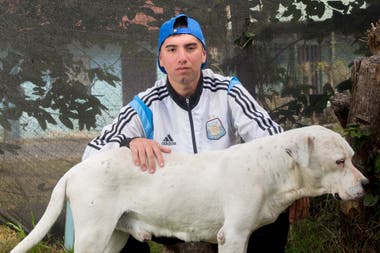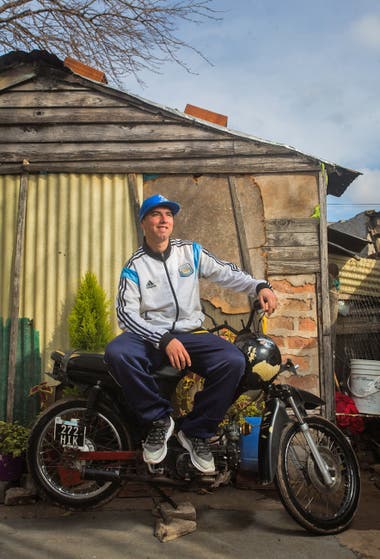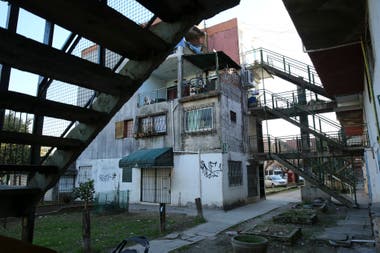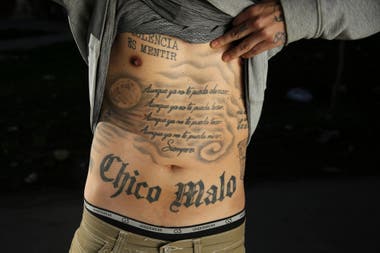“As they see you they treat you. And if they see you badly, they mistreat you.” Brian Landriel paraphrases Mirtha Legrand herself when she tries to find a possible why for him. police harassment, rejection at some job, the suspicious look that some people return to him.
But what do they see when they see it? “Come my sportswear, the visor, the haircut, the way I walk, the neighborhood where I come from. and they discriminate against me for all that, “laments this 27-year-old man, who was born in a small town in Dock Sud but lived most of his life in Bernal Oeste.
A fervent fan of Vélez Sarsfield, Brian does not remember situations of rejection during his childhood and adolescence. “I was always well received where I was going,” he says. The thing changed with the coming of age. Almost ten years later, an episode that marked her is still fresh in her memory.
“I once took the resume near the Obelisk for a job as a bachero. It was a job agency. They asked me what I was doing and where I was from. I told the person who interviewed me everything: I wanted to progress so I could leave the neighborhood. ‘ You have to stay in your neighborhood, ‘he replied, making me feel that I did not belong, who could not hope to have a bachero job for the Center. I felt very bad that time, “he recalls in dialogue with LA NACION.
At that time he did not understand why the doors were closed to his search for progress and improvement through work. Today he knows that this is one of the ways in which racism operates in Argentina. She has been suffering it in her own flesh. Not so much for “carrying face,” as he says, but for what he calls “wearing sportswear and visor“
“I once met a policeman who was good to me, but in general I felt very discriminated against by the police. I know that if I walk down a street and a police officer passes by, Most likely, I will stop asking for documents even though I am not doing anything wrong. It happens to me at the Lanús station all the time. The same policemen stop me every time. And when they stop you, they treat you badly, they suppose you’re a drug addict and maybe you are coming back from a dining room where you help or from playing soccer with your friends. It is ugly, it gives you a fight because it is unfair, “says the young man.

Before the pandemic, Brian was an employee of a car wash. Previously, he worked in pizzerias, coffee shops, in a tannery and in a plastic bag factory, as he lists. In addition, he collaborates with Socialba, a civil association that performs different social tasks in vulnerable neighborhoods of the City. More than a boy, he adds, he gathered cartons and bottles to cover his own expenses. “I have been working since I was twelve or thirteen years old. I finished my primary school and I started secondary school, but I did not finish it. It is something that I have pending,” he admits.
Among the different occupations he has had, he had a time as a stocking salesman and repairman with a friend. They went house by house, offering the merchandise. “Once, we were in Florencio Varela. It was re hot. We had sold re well, so we bought some sanguches and a Manaus in a kiosk and we sat down to eat. A patrol car stopped and the police approached us. They asked us what we were doing and we explained to them. They told us that we had to go, they kicked our sandwiches, they took our silver and they even took the soda. I remember that I took the train with a desire to cry. “, he remembers.
But the long list of discriminatory situations that he has had to live through does not only involve the police forces. “It happened to me from working in a laundry room and being called ‘black’ with contempt. Because you know when they mean it to you with bad intention. Or that they wouldn’t let me go to a dance because of my clothes or my haircut. I also remember having gone for a walk with a girl in Puerto Madero – she was cute and I with sports clothes – and that they looked at us as if they couldn’t believe that girl be with me. I know that, if I had been walking alone, some people would have avoided crossing with me, “he says.
In his document “Racism and Xenophobia. Towards an intercultural Argentina”, Inadi sheds light on this form of discrimination, widely naturalized in our society: “(.) From the discourse, the relationship between racism and poverty is notable when expressions are heard associated with classic biological racism (“they are blacks”) (.) In turn, the ideological process of criminalization of poverty has a racist matrix and in Argentina it is expressed in the stereotype of “pibe chorro”: a young male with visor cap and sneakers, with a dark hair and skin tone. (.) “

Convinced that crime goes beyond any stereotype – “There are jets that dress really well and continue to be jets”, he exemplifies-, Brian acknowledges, in any case, that insecurity generates fears that are difficult to rationalize. “All the time you are being bombarded on television with images of squirting kids dressing up in sports. I understand that if you see someone dressed like that, you may feel persecuted. I try to put myself in the place of both the discriminator and the discriminated. But it is ugly to be judged for something you are not. We are not all the same, “he adds.
Today, Brian recognizes that, when looking for a job or in certain formal situations, he avoids caps and sports outfits. Of course, then, it is his turn to deal with the prejudice of his friends and neighbors: “They charge me. They tell me that I cheat,” he concludes.
ALSO
.
Publicado en el diario La Nación


